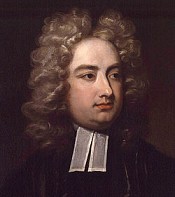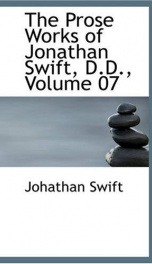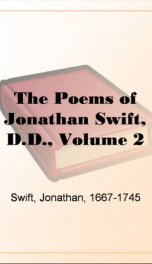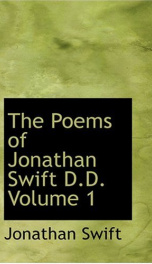Swift Jonathan

Jonathan Swift (30 November, 1667 – 19 October, 1745) was an Irish[1] satirist, essayist, political pamphleteer (first for the Whigs, then for the Tories), poet and cleric who became Dean of St. Patrick's, Dublin. He is remembered for works such as Gulliver's Travels, A Modest Proposal, A Journal to Stella, Drapier's Letters, The Battle of the Books, An Argument Against Abolishing Christianity, and A Tale of a Tub. Swift is probably the foremost prose satirist in the English language, and is less well known for his poetry. Swift originally published all of his works under pseudonyms—such as Lemuel Gulliver, Isaac Bickerstaff, M.B. Drapier—or anonymously. He is also known for being a master of two styles of satire: the Horatian and Juvenalian styles. Jonathan Swift was born at No. 7, Hoey's Court, Dublin, and was the second child and only son of Jonathan Swift (a second cousin of John Dryden) and wife Abigail Erick (or Herrick), paternal grandson of Thomas Swift and wife Elizabeth Dryden, daughter of Nicholas Dryden (brother of Sir Erasmus Dryden, 1st Baronet Dryden) and wife Mary Emyley. His father was Irish born and his mother was born in England. Swift arrived seven months after his father's untimely death. Most of the facts of Swift's early life are obscure, confused and sometimes contradictory. It is widely believed that his mother returned to England when Jonathan was still very young, then leaving him to be raised by his father's family. His uncle Godwin took primary responsibility for the young Jonathan, sending him with one of his cousins to Kilkenny College (also attended by the philosopher George Berkeley). In 1682 he attended Dublin University (Trinity College, Dublin), receiving his B.A. in 1686. Swift was studying for his Master's degree when political troubles in Ireland surrounding the Glorious Revolution forced him to leave for England in 1688, where his mother helped him get a position as secretary and personal assistant of Sir William Temple at Moor Park, Farnham. Temple was an English diplomat who, having arranged the Triple Alliance of 1668, retired from public service to his country estate to tend his gardens and write his memoirs. Growing into confidence with his employer, Swift "was often trusted with matters of great importance." Within three years of their acquaintance, Temple had introduced his secretary to William III, and sent him to London to urge the King to consent to a bill for triennial Parliaments. When Swift took up his residence at Moor Park, he met Esther Johnson, then 8 years old, the fatherless daughter of one of the household servants. Swift acted as her tutor and mentor, giving her the nickname "Stella" and the two maintained a close, but ambiguous relationship for the rest of Esther's life. Swift left Temple in 1690 for Ireland because of his health, but returned to Moor Park the following year. The illness, fits of vertigo or giddiness—now known to be Ménière's disease—would continue to plague Swift throughout his life. During this second stay with Temple, Swift received his M.A. from Hertford College, Oxford in 1692. Then, apparently despairing of gaining a better position through Temple's patronage, Swift left Moor Park to become an ordained priest in the Established Church of Ireland and in 1694 he was appointed to the prebend of Kilroot in the Diocese of Connor, with his parish located at Kilroot, near Carrickfergus in County Antrim. Swift appears to have been miserable in his new position, being isolated in a small, remote community far from the centres of power and influence. While at Kilroot, however, Swift may well have become romantically involved with Jane Waring. A letter from him survives, offering to remain if she would marry him and promising to leave and never return to Ireland if she refused. She presumably refused, because Swift left his post and returned to England and Temple's service at Moor Park in 1696, and he remained there until Temple's death. There he was employed in helping to prepare Temple's memoirs and correspondence for publication. During this time Swift wrote The Battle of the Books, a satire responding to critics of Temple's Essay upon Ancient and Modern Learning (1690). Battle was however not published until 1704. On January 27 1699 Temple died. Swift stayed on briefly in England to complete the editing of Temple's memoirs, and perhaps in the hope that recognition of his work might earn him a suitable position in England. However, Swift's work made enemies of some of Temple's family and friends who objected to indiscretions included in the memoirs. His next move was to approach King William directly, based on his imagined connection through Temple and a belief that he had been promised a position. This failed so miserably that he accepted the lesser post of secretary and chaplain to the Earl of Berkeley, one of the Lords Justices of Ireland. However, when he reached Ireland he found that the secretaryship had already been given to another. But he soon obtained the living of Laracor, Agher, and Rathbeggan, and the prebend of Dunlavin in St. Patrick's Cathedral, Dublin. At Laracor, a mile or two from Trim, County Meath, and twenty miles (32 km) from Dublin, Swift ministered to a congregation of about fifteen people, and had abundant leisure for cultivating his garden, making a canal (after the Dutch fashion of Moor Park), planting willows, and rebuilding the vicarage. As chaplain to Lord Berkeley, he spent much of his time in Dublin and traveled to London frequently over the next ten years. In 1701, Swift published, anonymously, a political pamphlet, A Discourse on the Contests and Dissentions in Athens and Rome. In February 1702, Swift received his Doctor of Divinity degree from Trinity College, Dublin. That spring he traveled to England and returned to Ireland in October, accompanied by Esther Johnson—now twenty years old—and his friend Rebecca Dingley, another member of William Temple's household. There is a great mystery and controversy over Swift's relationship with Esther Johnson nicknamed "Stella". Many hold that they were secretly married in 1716. During his visits to England in these years Swift published A Tale of a Tub and The Battle of the Books (1704) and began to gain a reputation as a writer. This led to close, lifelong friendships with Alexander Pope, John Gay, and John Arbuthnot, forming the core of the Martinus Scriblerus Club (founded in 1713). Swift became increasingly active politically in these years. From 1707 to 1709 and again in 1710, Swift was in London, unsuccessfully urging upon the Whig administration of Lord Godolphin the claims of the Irish clergy to the First-Fruits and Twentieths ("Queen Anne's Bounty"), which brought in about £2500 a year, already granted to their brethren in England. He found the opposition Tory leadership more sympathetic to his cause and Swift was recruited to support their cause as editor of the Examiner when they came to power in 1710. In 1711, Swift published the political pamphlet "The Conduct of the Allies," attacking the Whig government for its inability to end the prolonged war with France. The incoming Tory government conducted secret (and illegal) negotiations with France, resulting in the Treaty of Utrecht (1713) ending the War of the Spanish Succession. Swift was part of the inner circle of the Tory government, and often acted as mediator between Henry St. John (Viscount Bolingbroke) the secretary of state for foreign affairs (1710–15) and Robert Harley (Earl of Oxford) lord treasurer and prime minister (1711–1714). Swift recorded his experiences and thoughts during this difficult time in a long series of letters to Esther Johnson, later collected and published as The Journal to Stella. The animosity between the two Tory leaders eventually led to the dismissal of Harley in 1714. With the death of Queen Anne and ascension of George I that year, the Whigs returned to power and the Tory leaders were tried for treason for conducting secret negotiations with France. Also during these years in London, Swift became acquainted with the Vanhomrigh family and became involved with one of the daughters, Esther, yet another fatherless young woman and an ambiguous relationship to confuse Swift's biographers. Swift furnished Esther with the nickname "Vanessa" and she features as one of the main characters in his poem Cadenus and Vanessa. The poem and their correspondence suggests that Esther was infatuated with Swift, that he may have reciprocated her affections, only to regret it and then try to break it off. Esther followed Swift to Ireland in 1714, where there appears to have been a confrontation, possibly involving Esther Johnson. Esther Vanhomrigh died in 1723 at the age of 35. Another lady with whom he had a close but less intense relationship, was Anne Long, a toast of the Kit-Cat Club. Before the fall of the Tory government, Swift hoped that his services would be rewarded with a church appointment in England. However, Queen Anne appeared to have taken a dislike to Swift and thwarted these efforts. The best position his friends could secure for him was the Deanery of St. Patrick's, Dublin. With the return of the Whigs, Swift's best move was to leave England and he returned to Ireland in disappointment, a virtual exile, to live "like a rat in a hole". Once in Ireland, however, Swift began to turn his pamphleteering skills in support of Irish causes, producing some of his most memorable works: Proposal for Universal Use of Irish Manufacture (1720), Drapier's Letters (1724), and A Modest Proposal (1729), earning him the status of an Irish patriot. Also during these years, he began writing his masterpiece, Travels into Several Remote Nations of the World, in Four Parts, by Lemuel Gulliver, first a surgeon, and then a captain of several ships, better known as Gulliver's Travels. Much of the material reflects his political experiences of the preceding decade. For instance, the episode in which the giant Gulliver puts out the Lilliputian palace fire by urinating on it can be seen as a metaphor for the Tories' illegal peace treaty; having done a good thing in an unfortunate manner. In 1726 he paid a long-deferred visit to London, taking with him the manuscript of Gulliver's Travels. During his visit he stayed with his old friends, Alexander Pope, John Arbuthnot, and John Gay, who helped him arrange for the anonymous publication of his book. First published in November 1726, it was an immediate hit, with a total of three printings that year and another in early 1727. French, German, and Dutch translations appeared in 1727 and pirated copies were printed in Ireland.
do you like this author?
What readers are saying
What do you think? Write your own comment on this book!
write a commentWhat readers are saying
What do you think? Write your own comment on this author!
write a commentBook list

The Prose Works of Jonathan Swift,D.D. - Volume 07
Historical and Political Tracts-Irish
Series:
Unknown
Year:
Unknown
Raiting:
3/5
Show more
add to favoritesadd In favorites

Gulliver's TravelsInto Several Remote Regions of the World
Series:
Unknown
Year:
Unknown
Raiting:
3.5/5
Show more
add to favoritesadd In favorites
Book list

The Prose Works of Jonathan Swift,D.D. - Volume 07
Historical and Political Tracts-Irish
Series:
Unknown
Year:
Unknown
Raiting:
3/5
Show more
add to favoritesadd In favorites

Gulliver's TravelsInto Several Remote Regions of the World
Series:
Unknown
Year:
Unknown
Raiting:
3.5/5
Show more
add to favoritesadd In favorites

The Prose Works of Jonathan Swift,D.D. — Volume 09
Contributions to The Tatler,The Examiner,The Spectator,and The Intelligencer
Series:
Unknown
Year:
Unknown
Raiting:
3/5
Show more
add to favoritesadd In favorites

The Prose Works of Jonathan Swift,D.D. — Volume 10
Historical Writings
Series:
Unknown
Year:
Unknown
Raiting:
4.5/5
Show more
add to favoritesadd In favorites

The Prose Works of Jonathan Swift,D.D. — Volume 06
The Drapier's Letters
Series:
Unknown
Year:
Unknown
Raiting:
3/5
Show more
add to favoritesadd In favorites

The Prose Works of Jonathan Swift,D.D. — Volume 04
Swift's Writings on Religion and the Church — Volume 2
Series:
Unknown
Year:
Unknown
Raiting:
3.5/5
Show more
add to favoritesadd In favorites

The Prose Works of Jonathan Swift,D.D. — Volume 03
Swift's Writings on Religion and the Church — Volume 1
Series:
Unknown
Year:
Unknown
Raiting:
2.5/5
Show more
add to favoritesadd In favorites

The Battle of the Books and other Short Pieces
Series:
Unknown
Year:
Unknown
Raiting:
2.5/5
Show more
add to favoritesadd In favorites

The Prose Works of Jonathan Swift, D.D. - Volume 07
Series:
Unknown
Year:
Unknown
Raiting:
3/5
EDITED BY TEMPLE SCOTT
Show more
add to favoritesadd In favorites

The Poems of Jonathan Swift, D.D., Volume 2
Series:
Unknown
Year:
Unknown
Raiting:
0.5/5
This book was converted from its physical edition to the digital format by a community of volunteers. You may find it for free on the web. Purchase of the Kindle edition includes wireless delivery.
Show more
add to favoritesadd In favorites

The Poems of Jonathan Swift, D.D., Volume 1
Series:
Unknown
Year:
Unknown
Raiting:
4.5/5
Edited by WILLIAM ERNST BROWNING.
Show more
add to favoritesadd In favorites

Three Sermons, Three Prayers
Series:
Unknown
Year:
Unknown
Raiting:
4.5/5
Webster's edition of this classic is organized to expose the reader to a maximum number of synonyms and antonyms for difficult and often ambiguous English words that are encountered in other works of literature, conversation, or academic examinations. Extremely rare or idiosyncratic words and expressions are given lower priority in the notes compared to words which are ¿difficult, and often encountered¿ in examinations. Rather than supply a single synonym, many are provided for a variety of meanings, allowing readers to better grasp the ambiguity of the English language, and avoid using the notes as a pure crutch. Having the reader decipher a word's meaning within context serves to improve vocabulary retention and understanding. Each page covers words not already highlighted on previous pages. If a difficult word is not noted on a page, chances are that it has been highlighted on a previous page. A more complete thesaurus is supplied at the end of the book; synonyms and antonyms are extracted from Webster's Online Dictionary. PSAT¿ is a registered trademark of the College Entrance Examination Board and the National Merit Scholarship Corporation neither of which sponsors or endorses this book; SAT¿ is a registered trademark of the College Board which neither sponsors nor endorses this book; GRE¿, AP¿ and Advanced Placement¿ are registered trademarks of the Educational Testing Service which neither sponsors nor endorses this book, GMAT¿ is a registered trademark of the Graduate Management Admissions Council which is neither affiliated with this book nor endorses this book, LSAT¿ is a registered trademark of the Law School Admissions Council which neither sponsors nor endorses this product. All rights reserved.
Show more
add to favoritesadd In favorites

Three Sermons: I. on mutual subjection. II. on conscience. III. on the trinity
Series:
Unknown
Year:
Unknown
Raiting:
2.5/5
This book was converted from its physical edition to the digital format by a community of volunteers. You may find it for free on the web. Purchase of the Kindle edition includes wireless delivery.
Show more
add to favoritesadd In favorites

The Prose Works of Jonathan Swift, D.D. — Volume 10
Series:
Unknown
Year:
Unknown
Raiting:
3/5
Show more
add to favoritesadd In favorites

The Prose Works of Jonathan Swift, D.D. — Volume 09
Series:
Unknown
Year:
Unknown
Raiting:
4.5/5
Show more
add to favoritesadd In favorites

The Prose Works of Jonathan Swift, D.D. — Volume 06
Series:
Unknown
Year:
Unknown
Raiting:
4.5/5
Show more
add to favoritesadd In favorites
What readers are saying
What do you think? Write your own comment on this author!
write a commentif you like Swift Jonathan try:
readers also enjoyed
What readers are saying
What do you think? Write your own comment on this author!
write a commentGenre
if you like Swift Jonathan try:
readers also enjoyed
Do you want to read a book that interests you? It’s EASY!
Create an account and send a request for reading to other users on the Webpage of the book!

